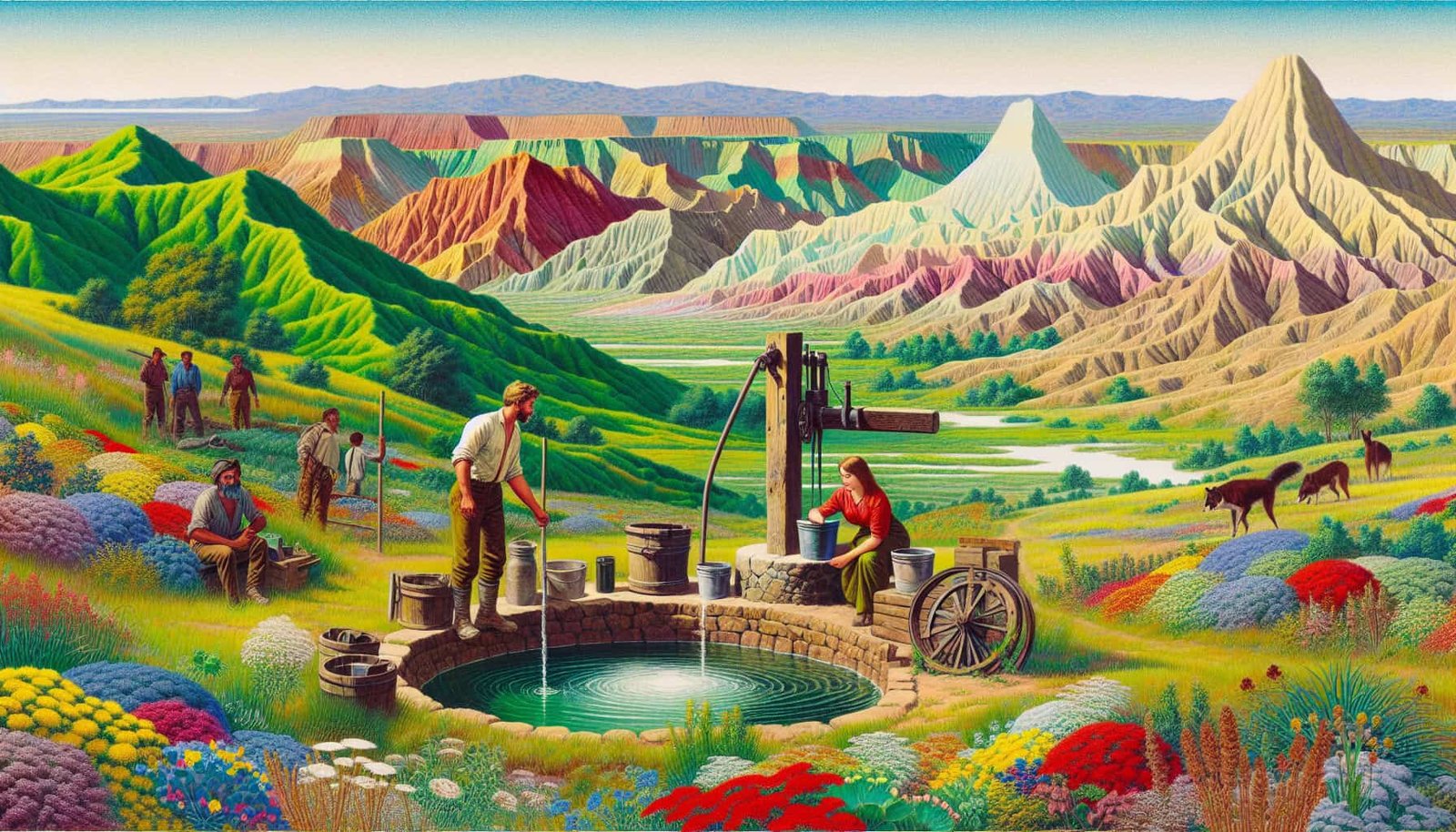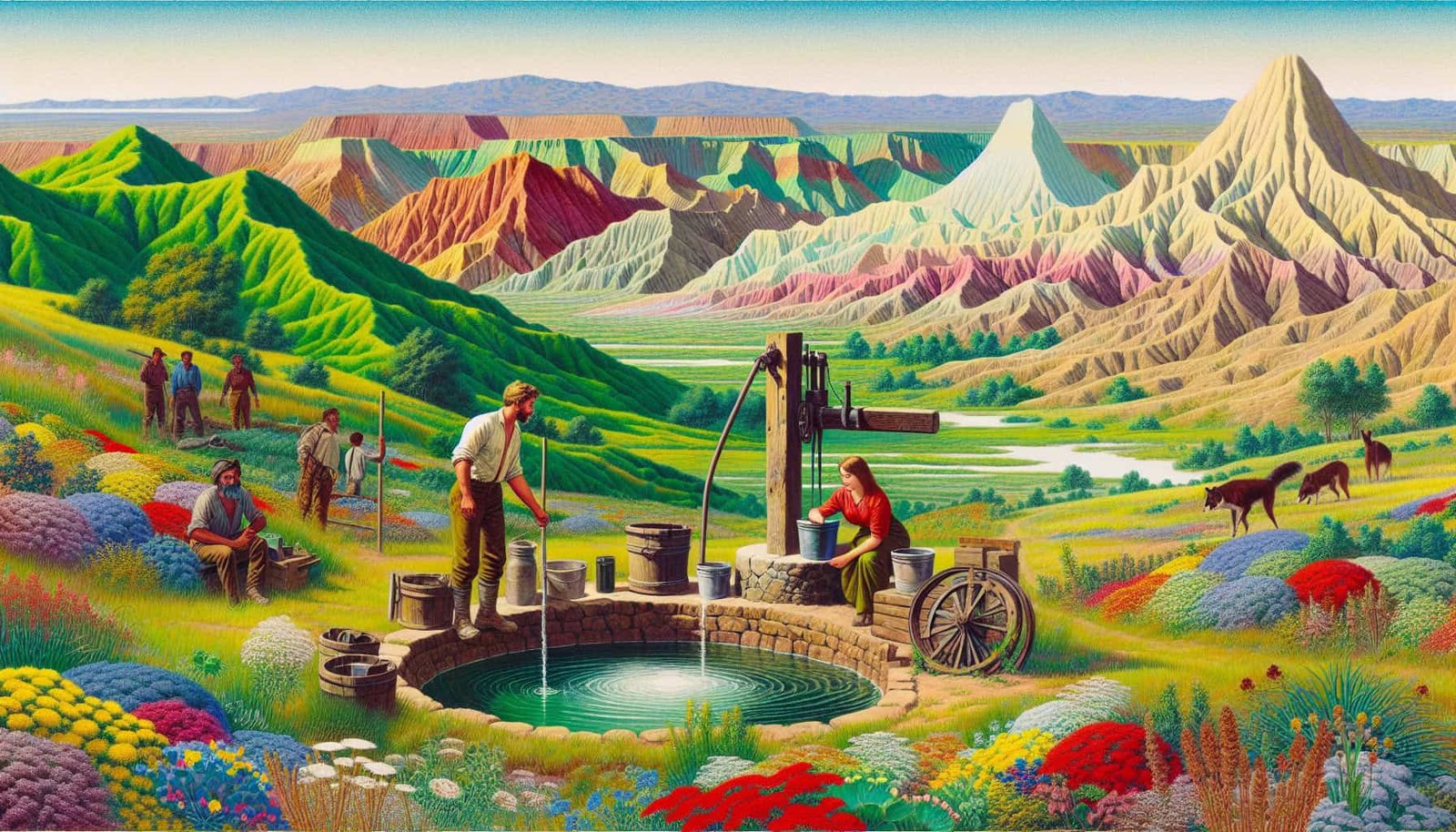Are you a well owner in a region with high mineral content in soil? If so, you may have questions about the impact of these minerals on your well water quality, and how to ensure the health and safety of your water supply. In this article, we will explore various resources available to you that can provide valuable information and guidance on managing your well in regions with high mineral content. From local government agencies to online platforms, there are plenty of sources that can help you understand the potential risks, treatment options, and preventive measures you can take to maintain the quality of your well water. So, let’s delve into these resources and equip you with the knowledge you need to keep your well water safe and sustainable.
Understanding Well Ownership and Regulations
Owning a well comes with certain legal considerations that every well owner should be aware of. Understanding the well ownership rights and the permitting and inspection requirements can help you navigate the regulations associated with owning a well.
Legal Considerations
When it comes to well ownership, there are a few key legal considerations to keep in mind. First and foremost, you must be aware of the legal requirements for owning a well in your area. This includes any permits that may be required to drill a new well or make modifications to an existing one. Additionally, you should be aware of any regulations regarding the use of the water from your well, such as restrictions on irrigation or commercial use.
Well Ownership Rights
As a well owner, you have certain rights and responsibilities. Understanding your rights can help you protect your investment and ensure that you are able to enjoy the benefits of owning a well. Common well ownership rights include the right to access and use the water from your well, as well as the right to control the well and make necessary repairs and modifications. It is important to familiarize yourself with these rights to avoid any potential conflicts or disputes in the future.
Permitting and Inspection Requirements
Permits and inspections are a crucial aspect of owning a well. The specific requirements for permits and inspections vary by location, but they generally involve obtaining a permit before drilling a new well or making modifications to an existing one. Inspections are typically conducted to ensure that the well is constructed and maintained in a safe and compliant manner. Familiarizing yourself with these requirements and staying up to date with any changes or updates can help you avoid legal issues and ensure the proper functioning of your well.
Identifying Mineral Content in Soil
If you’re located in a region with high mineral content in the soil, it is important to understand why this occurs and the impact it can have on water quality. By learning about testing methods for both soil and water, you can ensure the safety and quality of your well water.
Reasons for High Mineral Content
Regions with high mineral content in the soil often have geological factors to thank for this phenomenon. These regions may have natural deposits of minerals such as calcium, magnesium, iron, or sulfur, which can seep into the groundwater and affect the mineral content of the well water. Additionally, human activities like mining or industrial processes can also contribute to the presence of minerals in the soil.
Impact on Water Quality
High mineral content in the soil can have a direct impact on the quality of well water. Some minerals, such as calcium and magnesium, can contribute to hard water, which can cause scale buildup in pipes and appliances. Other minerals, such as iron or sulfur, can give the water an unpleasant taste, odor, or discoloration. Understanding the mineral content in your soil can help you anticipate and address any potential issues with your well water quality.
Testing Methods for Soil and Water
To identify the mineral content in the soil and water, several testing methods are available. Soil testing can be done through laboratory analysis, which measures the concentration of various minerals present in the soil. Water testing, on the other hand, can be done through various methods, including sending samples to a certified laboratory or using home test kits. These tests analyze the water for minerals, pH levels, and other parameters that can help determine its quality. By regularly testing your soil and well water, you can stay informed about any changes or issues that may arise.

Local and State Government Resources
Local and state government agencies can be valuable resources for well owners seeking information and guidance regarding their wells. Departments of Environmental Protection, Health, and Agricultural Extension Offices are just a few examples of organizations that can provide assistance.
Department of Environmental Protection
The Department of Environmental Protection is often responsible for overseeing well drilling and construction regulations. They can provide information on permitting requirements, regulations, and guidelines for well owners. Additionally, they may offer educational materials or workshops on well maintenance and best practices for water conservation.
Department of Health
The Department of Health typically plays a role in ensuring the safety and quality of well water. They may provide resources on testing and treatment options, as well as information on potential health risks associated with high mineral content. Local health departments may also offer guidance on water testing and interpretation of results.
Agricultural Extension Offices
Agricultural Extension Offices are valuable resources not only for farmers but also for well owners in rural areas. These offices provide a wealth of information on soil health, water conservation, and best agricultural practices. They can offer guidance on managing minerals in the soil, as well as information on any potential impacts on crops.
Educational Institutions and Research Centers
Universities with departments specializing in geology or environmental science, water research institutes, and local geological surveys are excellent sources of information for well owners seeking to understand the mineral content in their soil and water.
Universities with Geology or Environmental Science Departments
Universities with geology or environmental science departments often conduct research on soil and water quality. They may offer courses, workshops, or seminars on topics relevant to well ownership, mineral content in soil, and water treatment. These institutions can be a valuable source of expertise and guidance for well owners looking to expand their knowledge in these areas.
Water Research Institutes
Water research institutes are dedicated organizations that focus specifically on researching water-related topics. They often conduct studies on water quality, conservation, and treatment methods. These institutes may provide access to research papers, publications, and experts who can offer specialized knowledge on mineral content in soil and water.
Local Geological Surveys
Local geological surveys are governmental or academic organizations that study geological formations and their impact on the surrounding environment. They often provide data and reports on soil composition, mineral content, and hydrogeological features of a specific region. These surveys can be an invaluable resource for well owners seeking information on the mineral content in their soil.

Non-Profit Organizations and Associations
Non-profit organizations and associations focused on groundwater and environmental conservation can offer support, advocacy, and educational resources for well owners.
National Ground Water Association
The National Ground Water Association is a non-profit organization dedicated to promoting the responsible use and protection of groundwater resources. They provide resources and information on well construction, maintenance, and water treatment. Well owners can benefit from their publications, webinars, and networking opportunities within the industry.
Well Owner Associations
Well owner associations are often regional or local groups that bring together well owners with a shared interest in maintaining and protecting their water resources. These associations can provide access to local experts, educational materials, and networking opportunities. They may also advocate for well owner rights and provide support in navigating regulations or addressing common well-related issues.
Environmental Advocacy Groups
Environmental advocacy groups focus on protecting and preserving the environment, including water resources. They can offer educational materials, workshops, and resources on water conservation, pollution prevention, and well maintenance. Joining or engaging with these groups can provide well owners with valuable insights and opportunities to participate in advocating for sustainable water practices.
Online Databases and Resources
The internet offers a wealth of information and resources for well owners. Online databases, well owner websites and forums, water testing laboratories, and government web portals are just a few examples of the online resources available.
Well Owner Websites and Forums
Numerous websites and online forums cater specifically to well owners. These platforms provide a space for well owners to connect, share experiences, and seek advice from fellow well owners. They often offer articles, guides, and frequently asked questions (FAQs) on various aspects of well ownership, including mineral content in soil and water treatment options.
Water Testing Laboratories
Water testing laboratories typically have an online presence and offer services to well owners looking to assess the quality and mineral content of their well water. These laboratories may provide convenient sampling kits that can be sent back for analysis. The test results can help well owners understand their water quality and determine whether any treatment or remediation measures are necessary.
Government Web Portals
Many government agencies have online portals that consolidate information relevant to well owners. These portals often provide resources on permitting requirements, regulations, water conservation, and water treatment options. They may also offer links to educational materials, testing labs, and relevant legislation. Check your local or state government websites for well-related information and resources.

Community Support and Networking
Connecting with other well owners in your community can offer valuable support, shared experiences, and access to local expertise. Local well owners associations, community meetings and workshops, and online discussion groups are great ways to establish connections within the well owner community.
Local Well Owners Associations
Local well owners associations are excellent resources for networking with other well owners in your area. These associations often organize community events, workshops, and meetings where well owners can share knowledge, discuss common issues, and learn from experts in the field. Joining these associations can provide you with a sense of community and the opportunity to engage with other well owners facing similar challenges.
Community Meetings and Workshops
Community meetings and workshops are often hosted by government agencies, non-profit organizations, or local universities. These events bring together well owners and experts to discuss topics like well maintenance, water treatment, and soil management. Attending these gatherings can provide you with valuable insights, allow you to ask questions, and learn from others’ experiences.
Online Discussion Groups
Online discussion groups or forums dedicated to well owners can be a convenient way to connect with other well owners, especially if community events are not easily accessible. These platforms allow you to ask questions, seek advice, and share experiences with a larger community of well owners. Participating in these discussions can help you stay informed, learn from others, and find support.
Certified Well Water Professionals
For more specialized assistance with your well, certified well water professionals such as well inspectors, contractors, certified water treatment specialists, geologists, and hydrologists can provide expert advice and services.
Well Inspectors and Contractors
Well inspectors and contractors are professionals who specialize in assessing the condition, functionality, and safety of wells. They can conduct inspections, identify potential issues, and provide recommendations for repairs or improvements. When hiring a well inspector or contractor, be sure to verify their certifications and experience to ensure you are getting reliable expertise.
Certified Water Treatment Specialists
If you are facing issues with your well water quality due to high mineral content or other factors, certified water treatment specialists can provide tailored solutions. These experts can assess the specific water quality issues, recommend appropriate treatment methods, and help implement and maintain the chosen treatment system. Look for specialists with certifications from respected organizations in the field of water treatment.
Geologists and Hydrologists
Geologists and hydrologists have extensive knowledge of the earth’s structure and the movement of groundwater. They can provide insights into the geology of your area, its impact on mineral content in soil and water, and potential risks or challenges related to your well. Consulting with a qualified professional in these fields can help you better understand and manage the mineral content in your soil and its effect on your well water.

Publications and Reference Materials
A wide array of publications and reference materials are available for well owners seeking more in-depth information on well ownership, water treatment, and soil management.
Guidebooks on Well Ownership
Guidebooks focused on well ownership can provide comprehensive information on topics such as well construction, maintenance, regulations, and testing. These publications often cover a wide range of issues relevant to well owners and can serve as a valuable reference when questions or concerns arise.
Technical Manuals on Water Treatment
Technical manuals that specifically address water treatment methods and systems can help well owners understand the various treatment options available. These manuals often go into detail about different treatment processes, equipment, and maintenance requirements. They can assist well owners in making informed decisions when it comes to choosing the appropriate water treatment approach for their specific needs.
Industry Journals and Research Papers
Industry journals and research papers provide in-depth analysis and the latest advancements in the field of well ownership, water treatment, and soil management. These sources can be particularly useful for those looking to stay up to date with new techniques, technologies, and scientific findings. Many of these publications are available online or through subscriptions to industry-specific associations.
Financial Assistance Programs
For well owners facing financial constraints, various financial assistance programs exist to help with well maintenance, repairs, and water treatment systems.
Grants and Loans for Well Maintenance and Repairs
Some governmental agencies, non-profit organizations, or local associations offer grants or low-interest loans to well owners for well maintenance or repairs. These financial assistance programs can help offset the costs associated with maintaining a safe and functional well.
Subsidies for Water Treatment Systems
For well owners in regions with high mineral content in the soil, subsidies may be available to help make water treatment systems more affordable. These subsidies can assist well owners in implementing effective treatment methods to address water quality issues caused by minerals.
Tax Incentives or Rebates
In certain areas, tax incentives or rebates may be available to well owners who invest in water conservation measures or energy-efficient equipment for their well. These incentives can help offset the financial burden of adopting environmentally friendly practices or upgrading well equipment.
By utilizing the resources mentioned above, well owners in regions with high mineral content in the soil can find the support, knowledge, and financial assistance they need to effectively manage their wells and ensure the safety and quality of their well water. Remember to reach out to the appropriate government agencies, local associations, educational institutions, and certified professionals for personalized guidance and recommendations based on your specific location and circumstances.


